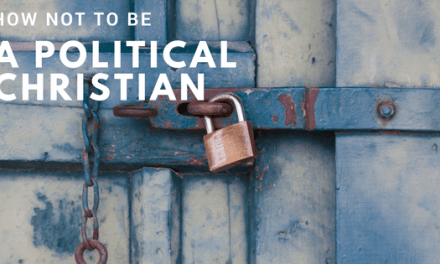When you grow up in the suburbs of Washington DC, like I did, the things you worry about as a kid are different. At least in my house and in my mind they were. I went to sleep at night wondering about the breakdown of Supreme Court justices, whether our party would maintain or take Congress back, and the pros and cons of campaign finance reform.
It didn’t seem strange at the time. It seemed normal. Now, I realize it is a little bizarre.
The term “big tent” is a political one. And in case you tuned out during Civics class, American History or American Government—and you didn’t grow up under my parents’ roof—the idea of the “big tent” is when a political party makes an effort to be inclusive. They reject single-issue campaigns and instead bank their reputation on being a hospitable place for all sorts of voters—even those with conflicting opinions on certain ideological issues.
“Big tent” is about as political a term as they come.
Several months ago I read Nadia Bolz-Weber’s book Pastrix, where she talked about coming face to face with her idea of tent religion. To say Nadia is a progressive Christian is an understatement. Her personal mission is to create as big a tent as possible for people on the fringes—to create a space where anyone and everyone can come and experience God—no exceptions. But in her book she confessed there were times when even she—a heavily tattooed, recovering alcoholic, whose church is home to some of the most unlikely candidates—has struggled to make the tent as big as it should be.
The word inclusion when it comes to this tent, she writes, seems innocuous, but assumes a level of ownership we, as followers of Jesus, don’t actually have. Inclusion, of whomever we open our arms to, still implies an authority that isn’t ours—like admission inside is our decision to make.
“It’s God’s tent,” she writes. It isn’t really our say who gets in and who stays out. And that doesn’t always sit well with us.
The challenge with the tent isn’t a new one. It’s been an issue since the infancy of the Church, and we get to read about it in Acts 15, at the Jerusalem Council. Paul and Barnabas had been busy making disciples of all nations, like Jesus had commissioned His followers to do, except there had been a problem. They had gotten so excited in converting people they had neglected to circumcise them.
The church in Jerusalem caught wind of what was happening and couldn’t believe the oversight. Paul and Barnabas were called back to stand before the council and explain their behavior. Just what did they think they were doing? Just who did they think they were? This was a watershed moment for the church. And the question came down to this: would followers of Jesus be required to become Jewish first, or was the tent going to be bigger than even the original Jewish followers of Jesus imagined?
It’s a tense moment. And to deliver the verdict, James speaks up. James, the brother of Jesus. James, who refused to follow his brother Jesus prior to His death and resurrection, but who changed his tune once he saw his crucified brother, alive. James, a good Jewish boy, who probably balked and judged, condemned and recoiled each time he heard of his brother touching, healing, teaching and welcoming those who should have been considered too far outside the fold to do anything for. James, who now understood his brother to be God’s Son, but who had a lifetime of entrenched thinking and disbelieving to overturn.
It’s this James who says, “It is my judgment, therefore, that we should not make it difficult for the Gentiles who are turning to God.”
You might say James’ point is: “It’s God’s tent—not mine.”
“Who are we,” he seems to be asking, “to keep out those my brother, and our God, would invite in?”
A pertinent question then, and now. Who are we to assume a level of ownership never granted us over a tent we had no part in creating?
It’s not our tent.
Progressive or conservative. Republican or democrat. Reformed or Emerging. Whoever it is that makes us feel slightly uncomfortable to share a roof with, in this gathering of believers we call the Church, it seems we better make room for. And get over it—get over ourselves—because it’s not our tent.
If all we are interested in doing is relegating admission into the tent—either in making it smaller, or making it bigger—we are still operating under a false premise, operating with an authority that isn’t ours to wield. Instead, we need to be people who live every day, in disbelief, in wonder, in gratitude that the tent was opened for us. We are not part of the religious establishment. We are not going to participate in power plays, negotiations and shaming. We are not politicians, after all. We are Christians. And that means we ought to be looking in the eye those wanting in the tent, opening our arms and assuring them, “It’s not my tent! But I know whose tent it is. And if He let me in, I think you’re good.”
You know what the beauty is in surrendering our hold on the tent? It means the burden of responsibility in making everyone like God—or like us, as to often is the case—is gone. It means, we do our part to show people God, to teach what Jesus taught, to encourage life and discipleship and renewal—and then we let God do the work. We let the Holy Spirit do His thing. We let go.
It’s not our tent. And after those terrifying, insulting, and angry feelings pass, we just might begin to realize how good that news really is.

